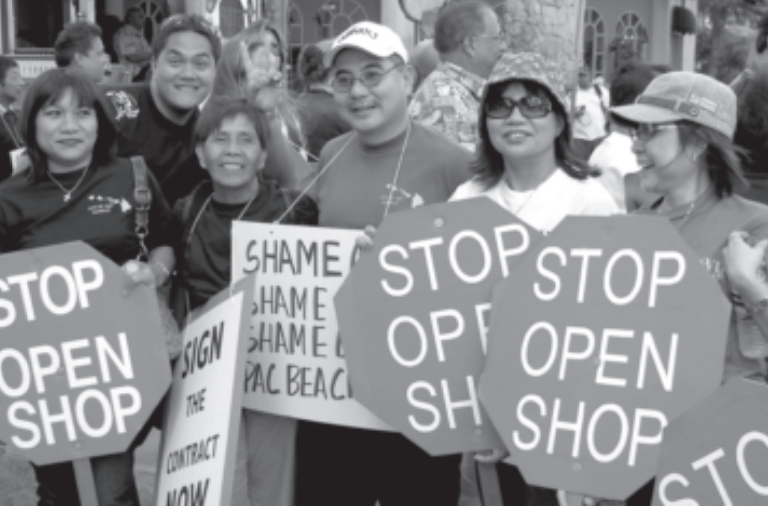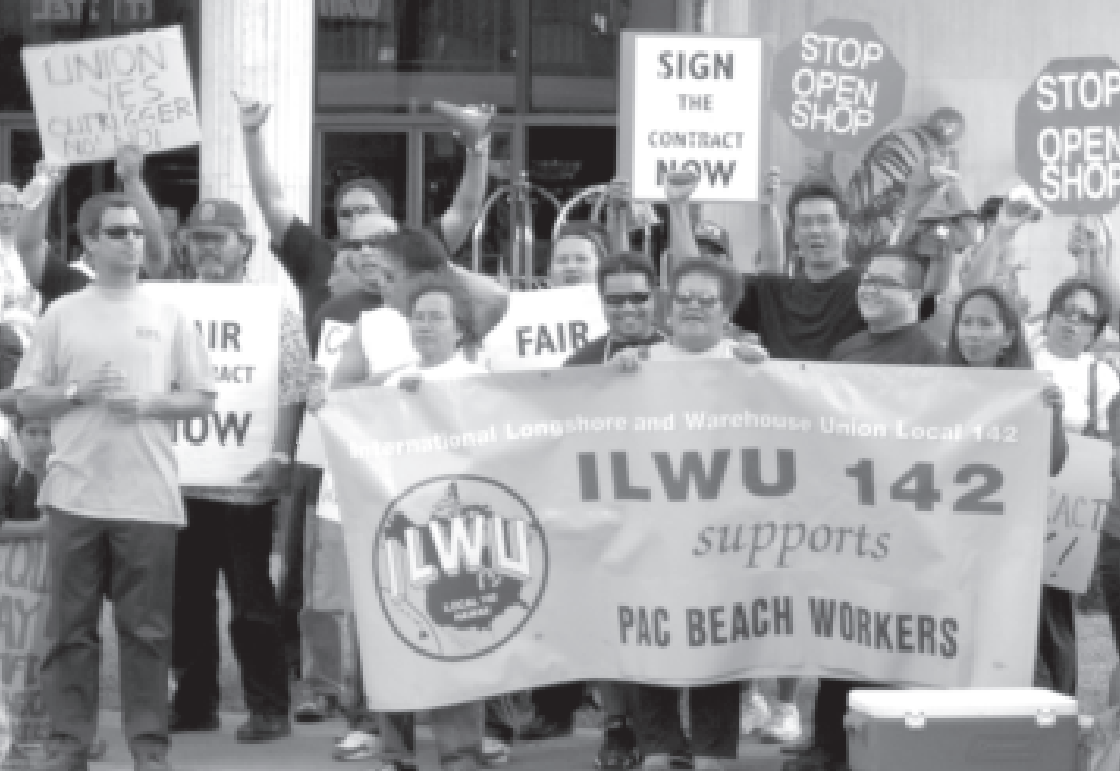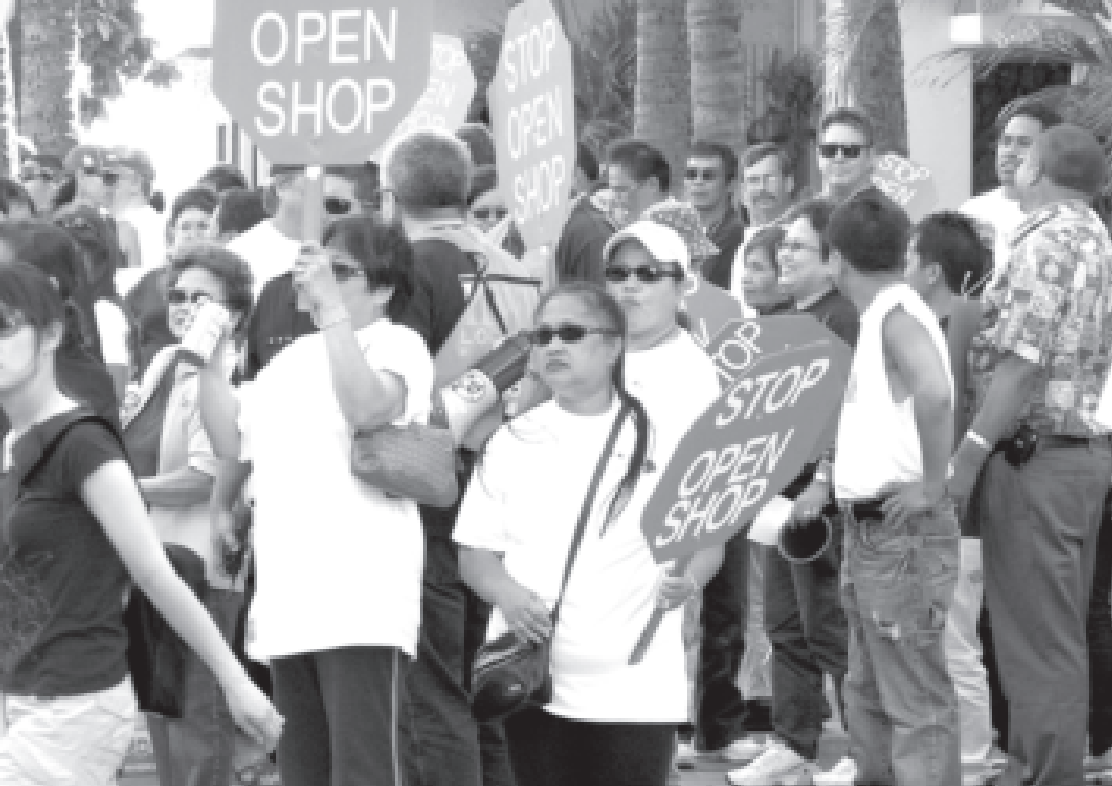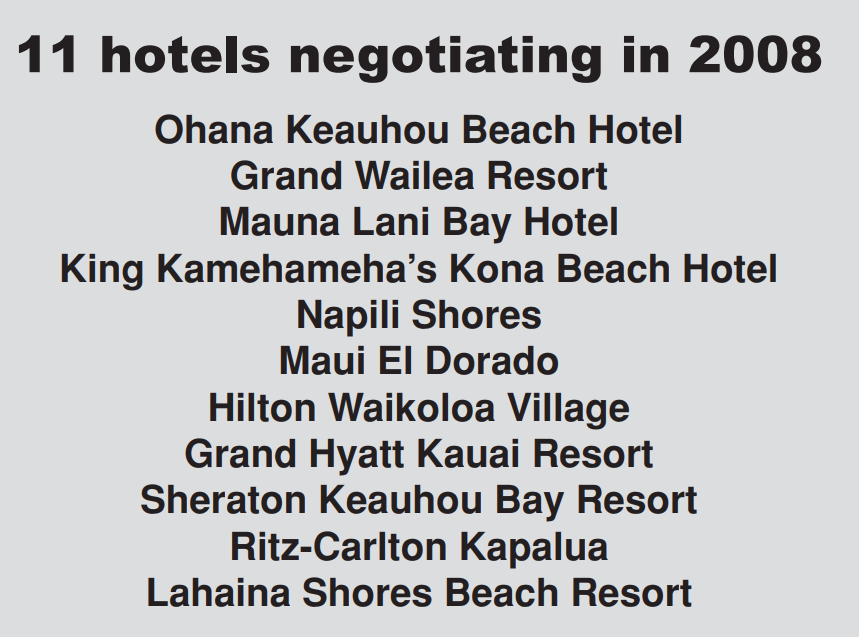
Conference delegates were shown detailed charts of how their wages and benefits compared with other ILWU hotels in the same “class”—luxury, deluxe, standard, or budget. Luxury hotels list most of their rooms at rates of over $500 a night. This is called a “published” or “rack rate” in the travel industry, and is usually much higher than the actual price charged by the hotel. Deluxe hotels had rack rates between $250 and $500 a night for most of their rooms. Standard hotels listed their rooms between $100 and $250, and budget hotels have rooms for under $100 a night.
“composite wage rate” of each hotel. The composite wage rate takes the hourly wage of six job classifications—a first cook, kitchen steward, combination bartender, housekeeper, engineer first class, and greeter. The hourly wages are added together and divided by six to obtain an average wage. Such a composite wage rate can only give a rough comparison, as it does not account for different workloads, staffing levels, or responsibilities of the job at each hotel.
Among the luxury hotels, the Grand Hyatt Kauai had the highest composite wage of $19.68 an hour. The Hyatt Maui, Westin Maui, and Grand Wailea Resort had composite wages of over $19.00 an hour. However, there were luxury hotels with much lower composite wage rates, and these hotels need to place a priority in bringing their wage rates up as they negotiate new contracts.

“Stop Open Shop!” was the rallying cry of the Pacific Beach workers. In negotiations with the ILWU, management is insisting on “open shop” language which would allow individual employees to receive all the benefits of union representation without paying union dues. Such a provision in the contract would weaken and destroy the union, which is exactly why management wants an “open shop.”

Conference delegates learned how their Divisions will prepare for the 2008 hotel negotiations. Maui Division Director Willie Kennison explains his plans to begin working with unit leadership in the hotels to mobilize members at least six months before negotiations. One delegate suggested that mobilizing nine months before would be better.

Delegates met separately with their Divisions to talk about mobilizing at their hotels. Division Director Richard Baker talks about the need for units to recruit more leaders and union stewards to help educate and mobilize members for negotitations.

A second important comparison is the amount employ ees must pay for their medical and dental benefits.
At some ILWU hotels, employees must pay 10-15% of the cost of the medical plan or a flat rate of $20 or $40 a month and more for family medical coverage. In addition, employees may have to pay part of the annual increases in the cost of these plans. Hotel management has no control over the price charged by HMSA and other medical plan providers, and the price of these plans increase every year. One or two high cost medical claims can also result in a huge increase in medical premiums.
A number of ILWU hotels pay 100 percent of the cost of medical, but some of these health plans may provide only the minimum coverage required by state law. Certain medical procedures or medication may not be covered, the amount reimbursed by the plan may be lower, deductibles may be higher, and workers will end up paying more money out of their pockets.
The best medical benefits are at those hotels in the ILWU/Tourism Industry Health and Welfare Trust Fund. Workers at those hotels pay no co-share of the premiums for single or family coverage. Members have the choice of Kaiser or the fee-forservice arrangement where you choose your doctor and the plan reimburses part of the costs. The benefits covered by the plan is the same for all islands and are balanced to provide good, comprehensive health care at the best price.
Nearly 3,000 ILWU members at six hotels are currently in the Health and Welfare Trust Fund. The hotels are: Grand Hyatt Kauai, Hyatt Regency Maui, Hilton Waikoloa, Koele Lodge and Manele Bay Resort, and the Kaanapali Beach Hotel.
The union’s medical plan expert, Paul Tom, explained how both workers and the hotels benefit by joining the Health and Health Trust Fund. The large pool of workers covered by the fund spreads the risks of catastrophic illnesses and gives the fund the buying power to provide better benefits. A new benefit added this year will reimburse up to $100 for air travel to another island for non-emergency medical services not available on your island. (You need prior authorization from HMA, the company that administers the medical program for the Health and Welfare Trust Fund.)
Hotel management also benefit because management knows exactly what their medical costs will be for the duration of the union contract. In addition, the union and hotels appoint an equal number of trustees who manage the Health and Welfare Trust Fund to best serve the interests of the members. There were a few problems when the fund first started, and there were some problems unique to Lana’i or areas such as Kona. But the trustees were able to quickly correct these situations and make changes when concerns are brought to their attention.
The union’s goal is to bring more hotels into the Health and Welfare Trust Fund and reduce and eliminate the amount workers pay for medical benefits.

Retirement and pension benefits are not the highest priority for most rank and file members of ILWU negotiating committees. Wages and medical come first, and retirement benefits are usually treated as one of many other cost items such as vacations, holidays, or sick leave. There is also a tendency to think that retirement is something far away in the future and can be improved at some later negotiations.
Most of us want a retirement where our standard of living remains the same. We don’t want to give up our cars, live on the beach, eat only one meal a day, or get a part-time job. To maintain the same standard of living, most of us will need at least 80 percent of our pre-retirement income. This 80 percent will usually come from three different sources— Social Security, the retirement plan from our jobs, and personal savings.
Social Security alone will not be enough for a comfortable retirement. A housekeeper who retires at the normal retirement age, for example, will get about 68 percent of his or her retirement income from Social Security, while a maintenance worker will get about 58 percent.
The next most important source of your retirement income is the Hotel Industry-ILWU Pension Plan which pays retirement benefits for ILWU hotel workers. [Other ILWU industries have similar plans.] Hotel management and the union are equal partners in managing the plan.

ILWU hotel members from the Neighbor Islands are inspired by the determination and spirit of the Pacific Beach workers’ in their struggle for a fair contract. Negotiations have dragged on for 18 months, but the workers are stronger and more united then before.

Tourism conference delegates got some practice on the picket line when they joined Pacific Beach Hotel workers for a spirited picket in front of the hotel on June 18, 2007. Pacific Beach Hotel workers want a union contract with no “Open Shop.” No other union hotel in Hawaii allows for an “open shop” because it hurts workers and only benefits management.

The detailed presentations on medical and pensions gave conference delegates a better understanding of the core issues in negotiations. “It opened my eyes,” said one delegate. “The discussion on medical and pension issues showed me how the union works to better our future living standards and retirement.” Another member commented, “Our members are getting older and we need to take of them.”

For an in-depth look at the Hawaii visitor industry’s profitability outlook for this year, turn to page 8
